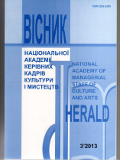Artistic interpretation myths desolate land
DOI:
https://doi.org/10.32461/2226-3209.3.2013.137424Keywords:
anti-utopia, Arthurian cycle, interpretation, mythologeme, Shakespeare, "Truth of the King", the WastelandAbstract
The Artistic Interpretation of the Mythologeme of the Wasteland. The mythological belief in the mystical role of the ruler demanded the proper kind of behavior both from the subjects and the ruler himself. This complex of rules was known as "the Truth of the King". The violations of the "Truth" was believed to lead to the disruption of the social and Cosmic laws. One of the results was the turning of the realm into the Wasteland. The mythologeme of Wasteland is well-known in most European cultures, especially in British, where it is connected with the Arthurian cycle and the search for the Grail. However, the role of the mythologeme is much more important, as it can be traced in many works of art, from Shakespeare to T.S. Eliot and far beyond. In the modern culture there are three main variations of the theme: 1) the "Return of the King", 2) the revolution, 3) the anti-utopia. All these variants are to be found in different national cultures in different media and genres, from Soviet children’s tales to Hollywood blockbusters.Downloads
Published
Issue
Section
License
Authors who publish with this journal agree to the following terms:
1. Authors retain copyright and grant the journal right of first publication with the work simultaneously licensed under a Creative Commons Attribution License International CC-BY that allows others to share the work with an acknowledgement of the work's authorship and initial publication in this journal.
2. Authors are able to enter into separate, additional contractual arrangements for the non-exclusive distribution of the journal's published version of the work (e.g., post it to an institutional repository or publish it in a book), with an acknowledgement of its initial publication in this journal.
3. Authors are permitted and encouraged to post their work online (e.g., in institutional repositories or on their website) prior to and during the submission process, as it can lead to productive exchanges, as well as earlier and greater citation of published work (See The Effect of Open Access).


